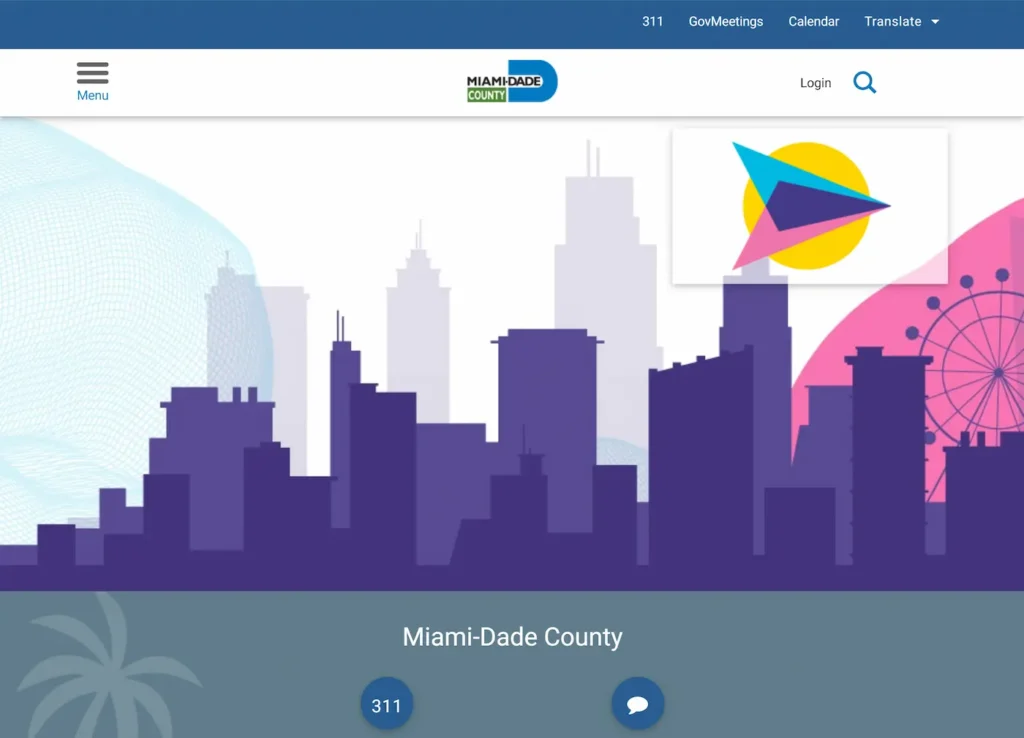|
Getting your Trinity Audio player ready... |
Tabla de Contenido/ Table of Contents
- 1 Is Daniella Levine Cava the Transformational Leader That Miami-Dade Needs? The Central Figure in Miami-Dade Politics
- 1.1 History of Miami-Dade Mayors: A Shift in Power
- 1.2 First Election: A Surprising Victory?
- 1.3 Reelection in 2024: A Broader Government?
- 1.4 Election Laws and Transparency
- 1.5 Key Donors Supporting Levine in Her Election and Reelection: What’s Behind the Republican Support?
- 1.6 Key PAC Contributions:
- 1.7 Impact on Local Politics
- 1.8 The Impact of a Second Donald Trump Presidency on Miami-Dade
- 1.9 The Role of “RINOs”
- 1.10 Strategic Alliances for Future Benefits?
- 1.11 The Alexander Otaola Lawsuit: A Transparency Issue?
- 2 Frequently Asked Questions (FAQ):
Is Daniella Levine Cava the Transformational Leader That Miami-Dade Needs? The Central Figure in Miami-Dade Politics
Daniella Levine Cava, the first woman to hold the office of mayor in Miami-Dade County, has cemented her position as one of the most influential figures in local politics. With nearly 40 years of public service, her leadership has drawn both praise and criticism, especially under the scrutiny of a potential second Donald Trump presidency and the crucial role of Republican figures like Marco Rubio on the national and international political stage. This article examines her impact, political alliances, and controversies, including her ability to build a broader and more diverse government in her second term.
History of Miami-Dade Mayors: A Shift in Power
Political leadership in Miami-Dade has alternated between Democrats and Republicans over the decades, reflecting the diversity of its electorate. The data shows that Democrats have governed for 33 years compared to 15 years under Republicans. Levine Cava represents a new phase in this alternation, bringing a progressive approach to a county traditionally shaped by political pragmatism.
| Party | Name | Term | Years in Office |
|---|---|---|---|
| Democrats | Jack Orr | 1972–1974 | 2 years |
| Stephen P. Clark | 1974–1993 | 19 years | |
| Alex Penelas | 1996–2004 | 8 years | |
| Daniella Levine Cava | 2020–2024 (ongoing) | 4+ years | |
| Total Democrat | 33 years | ||
| Republicans | Carlos Alvarez | 2004–2011 | 7 years |
| Carlos A. Giménez | 2012–2020 | 8 years | |
| Total Republican | 15 years |
This historical shift demonstrates how Miami-Dade’s leadership has changed according to the needs of the moment, with Democrats enjoying a longer overall dominance. [Link to historical data].
First Election: A Surprising Victory?
In 2020, Levine Cava won 53.9% of the vote, marking a shift toward progressive policies in a county previously under Republican leadership for 16 consecutive years. This milestone reflected her ability to attract a diverse coalition of voters and establish herself as a leader committed to social justice and sustainable development. Her victory also highlighted the influence of independent and Latino voters.
Reelection in 2024: A Broader Government?
In her second term, Levine Cava secured 59% of the vote, although with a significant decline in voter turnout, reflecting some political apathy. Despite this, she has used her reelection to expand the county’s government. During her first term, the county employed approximately 28,000 workers; since then, this number has grown to over 31,000 employees, raising some concerns due to the creation of new departments.
A notable administrative change was the hiring of Manny Cid, the former Republican mayor of Miami Lakes and Levine Cava’s former political opponent in the Miami-Dade mayoral race. He now leads a newly created department for managing intergovernmental alliances. This appointment underscores Levine Cava’s strategy of integrating figures from both parties, though it has raised questions about her political independence.
Election Laws and Transparency
Florida election law requires all donations, including those made through PACs, to be public. However, the high volume and complexity of these transactions can make it challenging to trace the true interests behind campaigns.
In Miami-Dade County, the management of campaign donation documents is regulated by both Florida state laws and local ordinances. Below is an outline of how the process works and the specific laws governing campaign donation transparency, particularly for the mayor’s office:
1. Transparency and Public Access to Campaign Donations
- Florida Election Code (Chapters 97–106 of the Florida Statutes):
Regulates elections, financial reports, and campaign donations across Florida, including Miami-Dade’s local elections.- Section 106.07: Requires all candidates to submit periodic reports detailing campaign contributions and expenses.
- Reports include donor name, address, occupation, and the amount donated.
- Miami-Dade County Ordinance (County Code):
Reinforces transparency requirements established by state laws.- Requires all campaign finance reports to be submitted to the Miami-Dade Elections Department and made publicly available.
- Public Access:
- Donation records are accessible on the Miami-Dade Elections Department website. Anyone can review donations made to local campaigns, including mayoral races.
- The public search system allows financial campaign reports to be consulted for verifying the origin and amount of donations.
2. Specific Rules for the Miami-Dade Mayor’s Office
- Contribution Limits:
Under Florida law, donations to candidates for local offices (including mayoral candidates) are limited to $1,000 per individual or entity per election (primary and general). - Exceptions and PACs:
PACs can raise unlimited funds, which are used to support or oppose candidates. This can complicate tracing money when PACs are used instead of direct donations. - Detailed Disclosure:
Candidates must submit reports detailing not only received donations but also how funds were spent.
3. Specific Laws Governing Donation Information
- Section 106.07 of the Florida Statutes:
Mandates candidates to report campaign contributions and expenses.
Requires periodic reports (monthly, quarterly, and pre-election). - Section 119.01 of the Florida Statutes (Public Records Law):
Guarantees public access to government documents, including those related to political campaigns. - Miami-Dade County Ethics Code:
Prohibits public officials from accepting contributions that could compromise their impartiality or create conflicts of interest.
Key Donors Supporting Levine in Her Election and Reelection: What’s Behind the Republican Support?
In the political and economic landscape of Miami-Dade, real estate developers and major corporations have played a pivotal role in campaign financing and guiding key county projects. Among the most prominent are:
- Ken Griffin (Citadel): $500,000. Griffin praised Levine Cava’s leadership in public safety and development, though his interests in Citadel’s new headquarters in Brickell raise questions about potential conflicts of interest.
- Jorge Mas (MasTec): $260,000. A key player in infrastructure projects and owner of Inter Miami CF soccer team. MasTec has secured multimillion-dollar contracts related to infrastructure and the development of Inter Miami CF. The company has also been involved in significant government projects, including facilities costing over $150 million.
- The Southern Group: $305,000. Represents interests in smart infrastructure and urban expansion in Doral and other key areas.
- Triple Five: $125,000. Promoters of the multibillion-dollar American Dream Miami mega-mall project.
- Terra (David Martin): $90,000. Linked to multimillion-dollar subsidies for projects in Coconut Grove and Miami Beach.
Stephen M. Ross, the founder and majority shareholder of Related Companies, as well as the owner of the Miami Dolphins and Hard Rock Stadium, has provided significant financial backing to Daniella Levine Cava’s campaign. His support highlights his interest in strategic projects in Miami-Dade, where he wields considerable influence as a developer and entertainment figure. In 2022, Levine Cava’s administration negotiated a deal that increased annual subsidies to the stadium from $5.8 million to $7 million and included an additional $15 million for the 2026 World Cup.
Michael Swerdlow: A prominent real estate developer in South Florida with strong ties to Miami-Dade. He is known for leading projects such as Biscayne Landing, initiated in 2005, which aimed to transform the former Munisport landfill into a community with 5,000 condominiums, a hotel, and a charter school. His work has been crucial in the county’s urban development, repurposing complex lands and generating infrastructure and economic opportunities.
Lewis Swezy: Founder and president of Centennial Management Corp., a leading real estate developer in South Florida. His company manages over 3,300 residential units and 900,000 square feet of commercial space, focusing on affordable housing funded through programs such as LIHTC. Notable recent projects include Princeton Manor, a 132-unit affordable housing complex for seniors in Miami-Dade.
Armando Codina: Founder and executive chairman of Codina Partners, LLC, Codina is a prominent real estate developer in South Florida. His company, established in 2009, has driven key projects in Miami-Dade, such as Downtown Doral and Beacon Logistics Park, contributing significantly to the county’s economic growth. His prior roles as president of Flagler and Codina Group have left a lasting impact on the local real estate sector.
Florida East Coast Industries (Brightline): Donated $125,000. Levine Cava supported the approval of a Brightline station in Aventura, inaugurated in December 2022.
Turnberry and Dacra: Both donated $25,000 each. These firms are linked to critical commercial projects in Miami-Dade.
Fontainebleau Development (Jeffrey Soffer): Donated $10,000 to Levine Cava’s PAC and received approval to develop a Westin hotel at Miami International Airport.
Swerdlow Group: Contributed $55,000. In May 2023, county commissioners approved the sale of a 17-acre county-owned site to the group for $8.1 million, despite two independent appraisals valuing the land at $31 million.
Atlantic Pacific Communities: Donated $40,000 between 2022 and 2023.
Other contributors include Florida Rising, Builders PAC, and Capital Construction LLC, all tied to significant economic interests in the county.
These developers have significantly contributed to the PAC supporting Mayor Levine Cava, underscoring the intersection of real estate development and politics in Miami-Dade.
It is important to highlight that political contributions from real estate developers to local campaigns can influence decisions on zoning, construction permits, and urban development policies.
For more detailed information on specific contributions and associated projects, it is recommended to consult campaign finance reports available at the Miami-Dade Elections Department and review public records related to county development projects.

Miami-Dade Mayor Daniella Levine Cava has received significant financial support from various Political Action Committees (PACs) for her campaigns. Below are some additional contributions to those previously mentioned:
Key PAC Contributions:
- Our Democracy PAC: This committee has been a primary vehicle for raising funds to support Levine Cava’s reelection. It has received substantial contributions from prominent figures, including a $500,000 donation from billionaire Ken Griffin, founder of Citadel. (Source: The Real Deal)
- Miami-Dade County Working With You PAC: Contributed $1,000 to Levine Cava’s campaign. (Source: Transparencia USA)
- Miami Realtors PAC: Donated $1,000, reflecting support from the local real estate sector. (Source: Transparencia USA)
- Teamsters 769 Political Committee: Contributed $1,000, indicating backing from unions and labor organizations. (Source: Transparencia USA)
- Ruth’s List Florida: Donated $1,000, showing support from organizations focused on promoting women’s political participation. (Source: Transparencia USA)
Impact on Local Politics
The ability of these companies to shape urban development policies and secure key contracts raises the question: to what extent can Levine Cava maintain her independence in the face of these economic actors?
The Impact of a Second Donald Trump Presidency on Miami-Dade
If Trump returns to power, his administration could significantly alter the dynamics between the federal government and Miami-Dade. Donald Trump has shown a policy of intolerance toward elections with ambiguous results or process failures. He questioned the legitimacy of the 2020 elections, alleging fraud without evidence, and promoted stricter laws in several states. His stance polarizes, defended as integrity and criticized as a threat to democracy.
Federal stances on immigration, funding, and relations with Cuba and Venezuela will directly affect Levine Cava, whose administration has championed inclusive policies.
In this context, Marco Rubio, appointed to lead the State Department, will play a crucial role in spearheading initiatives against the dictatorships in Cuba and Venezuela. Rubio, with his firm stance on human rights, could pressure Levine Cava to align local policies with Republican federal priorities.
The Role of “RINOs”
The support of moderate Republicans, known as “RINOs” (Republicans In Name Only), raises questions about the unity of the Republican Party in Miami-Dade.
Are these alliances tactical to ensure specific projects, or do they reflect a shift in local political dynamics?
The relationship between Levine Cava and the RINOs highlights a unique political dynamic in Miami-Dade, where pragmatism seems to have transcended traditional party lines. While some view this as an inclusive effort, others perceive it as a calculated strategy to consolidate political and economic power.
The hiring of a former Republican political rival with a $200,000 annual salary could be interpreted as an attempt to neutralize internal criticism and strengthen strategic alliances. However, it also raises questions about the use of public resources and the true interests behind this decision.
This analysis highlights the complex intersections between politics, economics and leadership in Miami-Dade under Daniella Levine Cava. Her ability to navigate these dynamics will define her legacy and the future of the county.
Strategic Alliances for Future Benefits?
It is possible that some Republicans who did not support Trump may join Democrats like Levine Cava to form political alliances that secure future benefits. Are these alliances tactical moves to gain power and resources, or do they reflect a genuine convergence of interests and values?
The Alexander Otaola Lawsuit: A Transparency Issue?
Alexander Otaola, a former mayoral candidate, filed a lawsuit against Levine Cava and the Elections Department, questioning the integrity of the electoral process. His case underscores tensions within the Cuban-American community, particularly on issues related to government transparency.
Frequently Asked Questions (FAQ):
- Why do prominent Republicans support a Democratic mayor?
Support from figures like Ken Griffin could stem from Levine Cava’s centrist policies, shared economic interests, or pragmatic strategies to secure favorable county projects and resources. - How does Alexander Otaola’s lawsuit affect Levine Cava’s image?
The lawsuit questions electoral transparency and could negatively impact public perception, especially within the Cuban-American community, eroding confidence in her leadership. - What impact would Donald Trump’s reelection have on Miami-Dade?
A Trump administration could alter federal-county collaboration, affecting key policies like immigration, Cuba relations, and funding for local projects. - What role do “RINOs” play in local government?
The involvement of moderate Republicans supporting Democrats like Levine Cava suggests pragmatic alliances or reflects internal divisions within the local Republican Party. - How influential are major donors in county politics?
To what extent do donors like Jorge Mas (MasTec), Citadel, Terra, and Triple Five influence decisions on key county projects? - Is Levine Cava an independent figure or influenced by major interests?
While her conciliatory stance has garnered broad support, her close ties to large donors and developers raise concerns about her independence and policy priorities. - Are all political donations public?
Yes, laws mandate that all donations, whether direct or through PACs, must be publicly reported. Lack of transparency could result in civil and criminal penalties. - What role do PACs play in elections?
PACs are key vehicles for funneling large sums of money into political campaigns, often representing specific interests like real estate developments and infrastructure projects. - Does Levine Cava favor Republicans or Democrats more?
Her ability to attract support from both parties reflects her adaptability, but also raises questions about the consistency of her political agenda and independence in decision-making. - What key projects are linked to Levine Cava’s donors?
From multimillion-dollar developments like Grove Central to the American Dream Miami project, her top donors have direct stakes in projects requiring county approvals.
Daniella Levine Cava: Taking Action in Miami Dade County
Want more post like this?
Head over to our homepage for the latest updates from South Florida and beyond:











